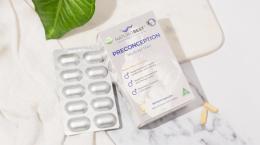What is the difference between prebiotics and probiotics?

You've probably heard the terms prebiotics and probiotics, but what exactly do they mean, what role do they play in keeping you healthy and how do they differ from each other?
What are prebiotics and probiotics?
Human health benefits of prebiotics and probiotics are crucial. However, they play several different roles:
- Probiotics: These live bacteria are present in several supplements and foods. They potentially offer a variety of health advantages.
- Prebiotics: These chemicals originate from carbohydrate types (mostly fibre) that are indigestible to humans. The help bacteria consume this fibre in your gut.
The gut bacteria carry out numerous crucial bodily processes, often known as the gut flora or gut microbiota.
Eating a balanced diet that includes both prebiotics and probiotics will help ensure that you have the right balance of these bacteria to maintain the health of your gut microbiota.
Why is gut bacteria beneficial?
Your digestive tract's beneficial bacteria work to keep you safe from dangerous bacteria and fungi.
According to a study on gut bacteria, a diversity of this healthy form of bacteria can strengthen the immune system, reduce depression symptoms, and combat obesity, among other things. (1)
Short-chain fatty acids and vitamin K are also produced by some of the bacteria in your gut.
Short-chain fatty acids are the main source of nutrition needed by the cells lining the colon. They support a healthy gut wall, which helps to keep bacteria, viruses, and germs out. This also helps to lower inflammation.
How does food affect your gut microbiota?
The mix of beneficial and harmful gut bacteria is significantly influenced by the foods you eat.
For instance, a diet high in sugar and fat has a harmful impact on gut flora and may be a factor in insulin resistance and other disorders. Once the incorrect bacteria are consistently fed, there are fewer beneficial bacteria to inhibit their colonisation, which allows them to multiply more quickly. (3)
In addition, eating pesticide-treated food may harm the flora in your stomach. However, additional research is needed to establish this. Research has also revealed that antibiotic use can permanently alter some bacteria types, particularly in young children and adolescents. (4) (5)
Which foods are prebiotics?
Prebiotics are specific kinds of fibre found in fruits, vegetables, and legumes, so it’s important to know many foods already contain prebiotics.
We cannot digest these fibres, but our healthy gut flora can. Foods high in prebiotic fibre include:
- Oats
- legumes, beans, and peas
- bananas
- Jerusalem artichokes
- berries
- asparagus
- garlic
- dandelion greens
- leeks
- onions
Additionally, prebiotic meals have been demonstrated to enhance metabolic health and possibly even aid in preventing some diseases. Finding the ideal prebiotic meals for you and your gut can take some time because so many choices are available.
Which foods are probiotics?
Additionally, many probiotic foods, like yoghurt, inherently contain beneficial bacteria.
If you want to increase the amount of healthy bacteria in your diet, a high-quality plain yoghurt with live cultures can be an excellent choice.
Another great choice is fermented food because it contains healthy bacteria that feed on the fibre and sugar in the food that occurs naturally.
Fermented foods include:
- sauerkraut
- kombucha tea
- kimchi
- some types of pickles
- kefir(dairy and nondairy)
- other pickled vegetables
Some of those meals can also be categorized as synbiotics since they contain both beneficial bacteria and a prebiotic fibre source for the bacteria to feed on.
- Cheese, kefir, and sauerkraut are a few examples of synbiotic foods.
How to choose your supplements
Probiotic supplements are live, helpful bacteria or yeast-containing tablets, powders, or liquids. Although they are widely used and simple to locate, not all are relevant to your specific needs as they don't all have the same strains of bacteria or at the same levels.
The bacteria in certain probiotic pills are intended to travel all the way to your large intestine for improved results. In contrast, those in others are likely to be destroyed by stomach acid.
Some people, such as those with small intestinal bacterial overgrowth (SIBO) or those sensitive to the supplement's contents, shouldn't take probiotics or may find that doing so worsens their symptoms. For certain people, the correct probiotic strains might be beneficial. It varies depending on strain type, product formulation, quality, and storage. (6)
As with other dietary supplements, you might wish to speak with a healthcare practitioner / medical expert familiar with probiotics in order to assist you with choosing a probiotic that is most relevant to your requirements.
In Summary
A healthy balance of gut flora is essential for many aspects of health. To do this, it’s recommended to eat a lot of prebiotic and probiotic foods since they will help to promote the ideal balance of good and bad gut bacteria.
Make sure you're eating the correct amounts of each by speaking with your healthcare professional. It's possible to overdo it or experience adverse effects.
Check out the World Gastroenterology Organisation Global Guidelines list of evidence-based conditions that probiotics may be able to treat to discover whether you could benefit from a supplement. It also contains suggestions.
Be sure to read the labels on any supplements thoroughly and talk with your healthcare professional about any concerns or suggestions.
References
- Quigley E. M. (2013). Gut bacteria in health and disease. Gastroenterology & hepatology, 9(9), 560–569. https://www.ncbi.nlm.nih.gov/pmc/articles/PMC3983973/
- Drago L. (2019). Probiotics and Colon Cancer. Microorganisms, 7(3), 66. https://doi.org/10.3390/microorganisms7030066
- Singh, R. K., Chang, H. W., Yan, D., Lee, K. M., Ucmak, D., Wong, K., Abrouk, M., Farahnik, B., Nakamura, M., Zhu, T. H., Bhutani, T., & Liao, W. (2017). Influence of diet on the gut microbiome and implications for human health. Journal of translational medicine, 15(1), 73. https://doi.org/10.1186/s12967-017-1175-y
- Defois, C., Ratel, J., Garrait, G. et al. Food Chemicals Disrupt Human Gut Microbiota Activity And Impact Intestinal Homeostasis As Revealed By In Vitro Systems. Sci Rep 8, 11006 (2018). https://doi.org/10.1038/s41598-018-29376-9
- Poulsen, M. N., Pollak, J., Bailey-Davis, L., Hirsch, A. G., Glass, T. A., & Schwartz, B. S. (2017). Associations of prenatal and childhood antibiotic use with child body mass index at age 3 years. Obesity (Silver Spring, Md.), 25(2), 438–444. https://doi.org/10.1002/oby.21719
- Sniffen, J. C., McFarland, L. V., Evans, C. T., & Goldstein, E. (2018). Choosing an appropriate probiotic product for your patient: An evidence-based practical guide. PloS one, 13(12), e0209205. https://doi.org/10.1371/journal.pone.0209205







